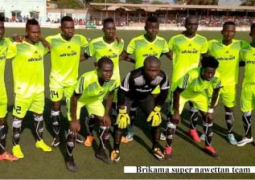
In the next 20 years, the alliance aims to completely eradicate hunger and malnutrition (objective “Zero Hunger”).In the shorter term, the alliance aims to build resilience among the vulnerable communities and households in the Sahel and West Africa so that they are better able to resist shocks.
This propels the West African Peasants and Producers Organisation (ROPPA) to participate in the process up to the extent of mobilising its member national organisations to have stake in the attainment of the process.
As a result, NACOFAG and her allies such as the National Farmers Platform took a step in attaining and mobilising stakeholders to engage in this development.
In August 28 - 30 2013 in Cotonou, Benin, through ROPPA, we participated in the regional workshop for the establishment of AGIR Technical Unit.In the process, CSOs were engaged into dialogue, lobbying and advocacy for the alliance.
FOs have been following the implementations of AGIR in other countries such as Burkina Faso, Mali and Senegal and of recent Guinea Bissau.These countries have formulated their National Resilience Priorities.
We are monitoring the next stages especially in preparation for the early 2016 engagements with ECOWAS/UEMOA among others on involvements of CSOs representations.We are committed to implement an intensive communications and lobbying campaign towards the process.
Therefore, the FOs in The Gambia are in pursuance to join her national stakeholders to help foster the attainment of the objective of the alliance:
Our role to be adequately recognised by the National Committee in all aspects of implementations of the AGIR;
Be supported financially and technically for grassroots engagement hence the target for AGIR rest with vulnerable groups that we represent as well;
Support for national dialogue by bringing CSOs/ NGOs/ GoTG among others for a roundtable donor conference as means of fundraising to support the implementations of the national priorities;
Upscale the promotions of the family farming observatory for increased productivity and resilience for the increase of household nutritional supplementary and degrade the menace of malnutrition especially at rural levels;
We are committed and will continue to be committed to seed security/ seed and cereal banking, value additions on food produced locally to meet standards and increase consumptions for what we produce;
Improve social protection for the most vulnerable households and communities in order to secure their livelihoods;
Strengthen the nutrition of vulnerable households;
Sustainably improve agricultural and food production, the incomes of vulnerable households and their access to food;
Strengthen governance in food and nutritional security.
It is as a result of the above that in 7 October 2014, ROPPA organised a training workshop in The Gambia within the framework of the family farming observatory implementations.
According to him, a survey was carried out depicting the ideas of the AGIR processes using family farming as tool or mechanism that can propel the realisation of the process which to our belief can inhibit the minimisations of shocks, malnutrition, and food insecurity and poverty especially among the women and youth in the rural communities.
He recommend that a comprehensive engagement of the GoTG and her stakeholders such as EU, UNDP, FAO, IFAD, UNICEF, agricultural projects (CPCU), NDMA, MoHSW, the private sector, AAITG among others to support the process especially the national priorities.


